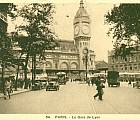Hadley Talks about the Lost Manuscripts


The autumn of 1922 was difficult for Hadley and Ernest, who had been married just over a year and were living in Paris. Ernest was a foreign correspondent for the Toronto Star, writing about everything from trout fishing and meeting Mussolini to inflation and the German currency. In September, Ernest was directed to go to Constantinople to write about the war raging between Greece and Turkey. It was a difficult assignment, made more challenging because Hadley did not want him to go. It was the first serious rift in their marriage, and Hadley was so adamant about his not going that they were not speaking to each other when he left. On that trip, Ernest was gone for a month and Hadley stayed in Paris. When Ernest returned, he was miserably sick with malaria and covered in bug bites.
On November 22, less than a month later, Ernest was sent to Lausanne Switzerland to write about the Peace conference in Geneva. Hadley stayed behind to nurse her cold, but Ernest wrote several letters, urging her to join him as soon as she was well. Finally, in the first week of December, she made plans to go to Switzerland. After the conference, they planned to go on to Chamby. As Hadley packed for the trip, she thought to bring Ernest’s works in progress so that he could share them with Lincoln Steffens, whom he had just met. She packed Ernest’s manuscripts, including the carbon copies, in a small overnight valise. These were early Nick Adams stories about Michigan, the short stories Ernest had been working on for months. As she boarded the train, she must have looked forward to seeing Ernest and their winter holiday in the mountains.

Gare de Lyon, the train station in Paris
What happened next is of course, legend. Hadley found her place on the train, stowed her bags, and went to buy water before the train left the station. When she returned, the small overnight bag was gone. Hadley sought help from the conductor and although they searched the train, the manuscripts could not be found. It was a long train ride for Hadley, who had to tell Ernest “such a thing”, when she reached her destination.
Ernest wrote in A Moveable Feast:
“I had never seen anyone hurt by a thing other than death or unbearable suffering except Hadley when she told me about the things being gone. She had cried and cried and could not tell me. I told her that no matter what the dreadful thing was that had happened nothing could be that bad, and whatever it was, it was all right and not to worry. We could work it out. Then, finally, she told me. I was sure she could not have brought the carbons too and I hired someone to cover for me on my newspaper job. I was making good money then at journalism, and took the train for Paris. It was true alright and I remember what I did in the night after I let myself into the flat and found it was true.”
In the audio clip below, Hadley answers Alice’s question about this event. If you have listened to the other clips, you will notice how difficult it is for Hadley to tell this story. Her usual effervescence is gone, she talks slowly and without her natural wit and playful way with words. As soon as the subject changes (at the end of the clip), Hadley is able to shake it off and is quickly back to her charming self again.
Any thoughts on what Ernest did that night in the flat? I’d love to hear your opinion –
Click here to listen to Hadley:







Extremely interesting and one of the most enduring mysteries of literature. Another great post, Allie!
I don’t know. That has always haunted me. I hate to even imagine.
Cursed. Punched a hole in the wall. Then cried himself to sleep.
Thank you Joe, Erika and Edlk for your thoughts on this – I’ve had a few emails today also suggesting that he hired a prostitute that night. Along with the fate of the suitcase, it is a Hemingway mystery we may never know the answer to, but it was dramatic enough for him to allude to it in A Moveable Feast.
Allie
Very interesting and well-written, Allie. Of course I had known of this event through “A Moveable Feast”, but not so much about it, thank you!
Thank you Robert! Isn’t it nice to hear some of these stories in Hadley’s own words?
All the best, Allie
Hired a prostitute! I guess he was pissed. “Analyse that,” as they say,
There are different sides to different people and my hearing is so poor I can’t listen to the audio’s — so I can’t catch any nuances. Why pack the carbons too? Nothing else was taken? They had been at odds. But we know Hadley was perfect, do we not?
Apologies for my comment under “A French Divorce”: I meant “splay-footed. ”
And as a Real Estate investor I forgot that making a purchase doesn’t necessarily mean a Paris apartment –after spending a month and more there for 25+ years — to others not similarly attracted but that is what I meant by the lawyer comment.
A friend took me and my husband to lunch at Le Close des Lilas and afterwards pointed out the Hemingway table in the bar –where he drank and wrote away the afternoons while Hadley was freezing upstairs.
Hi Adrienne,
A few other people have wondered about that too – What ever happened that night, it was significant enough for him to mention it in A Moveable Feast. And yes, of course, Hadley IS perfect! =)
Allie
Hi Allie! I think (well, I know) that this comment is going to ramble a bit, but I promise it’s relevant and I’ll try to make the explanation short!
I recently started reading Hemingway book-by-book, attempting to make my way through all of his novels in no particular order, and one of the things I noticed immediately about his writing is the biographical aspect that’s to be found in many of his novels. Of course it’s most obvious in “The Sun Also Rises” and “A Farewell To Arms”, but because I was reading a biography of him at the same time as I started, I began to get excited about “discovering” less obvious details of his life in other books as well.
One of the most surprising parallels that I saw, or thought I saw, was the scene in “The Garden of Eden” where the protagonist’s wife burns all of his manuscripts because she was jealous of the attention he gave to his press clippings and reputation. At other times in the book, it seemed that Ernest was basing the character’s situation on his relationship with Hadley and Pauline, at least in the few months leading up to his and Hadley’s divorce, so I found it very interesting that he would write about the wife (Hadley’s character, although not AT ALL similar to her personality) purposefully destroying her husband’s work out of jealousy, whereas in real life it was an honest mistake on Hadley’s part. It seems possible to me that the book could partially have been based on his relationship with the Hadley and Pauline, but with enough personalities and instances changed to put the “Ernest” character undeniably in the right. Even with as much love as he had for Hadley up until his death, it would seem by reading it that he still resented that episode in their life and was trying to express that.
Anyway, I was just wondering about your thoughts on it! Do you think there could be a parallel between the missing suitcase and the fictional manuscript-burning or am I so interested in Ernest and Hadley’s relationship that I’m finding references where there aren’t any? Either way, it’s terribly interesting to think about, and I’m very glad I discovered this website! It’s comparatively rare to find another woman’s commentary on Hemingway, let alone in an interesting and positive way– I’d almost given up on finding someone who felt almost the same way as I do about his life and writing, especially relating to Hadley and others in his life.
Either way, it’s terribly interesting to think about, and I’m very glad I discovered this website! It’s comparatively rare to find another woman’s commentary on Hemingway, let alone in an interesting and positive way– I’d almost given up on finding someone who felt almost the same way as I do about his life and writing, especially relating to Hadley and others in his life.
All the best!
We all know that Ernest was very dramatic! I feel that perhaps he did nothing more than cry himself to sleep over the lost material. The ominous “what I did” could have been just a way of saying, I’ve been really great to Hadley because it was just an accident, but I was REALLY heartbroken!!!! He clung to a few stories verbally and in his writing for the rest of his life, such as sleeping with Legs Diamonds girl in New York before returning to Paris in 1926 to betray Hadley with Pauline. Or that he would have really considered suicide when. he’d cut his ties to Hadley and hadn’t heard from Pauline when she was exiled to Piggott .He was just making a strong point with vigor. I think that the greatest result of Ernest’s and Hadley’s story is that she shared his best years and Pauline got the other Ernest!
I had never heard this. It’s so heartbreaking. I’m a writer and I have been fascinated by this story for years. I have lost things… some small passages due to computer issues and such and it’s always disturbing because there is a freshness that you can never get back. I had never really considered what a heavy burden this was for Hadley to bear, all those years. You can just hear it in her voice. I think, however, that Hemingway later wrote that he believed the loss of these writings is what made him into the writer he became. I think he said that he was going down a certain road, and once he had to essentially start over, he realized he could be a better writer. Just recently I found a box with some early writings of mine and they are terrible. Still, my heart breaks for Hadley and the guilt she must have felt.
Dear Rodney,
Thank you for your comment. Yes, the Hadley tapes are fascinating, and her recall of events that happened in the twenties seems so fresh. It is a treasure to hear her voice and emotions as she tells her stories. I will post more Hadley audio soon –
Thank you again, and welcome to the Hemingway Project!
Allie
Hi, everything is going sound here and ofcourse every one is sharing information, that’s genuinely fine, keep up writing.|
What’s up,I read your blogs named “Hadley Talks about the Lost Manuscripts | The Hemingway Project” on a regular basis.Your writing style is awesome, keep it up! And you can look our website about proxy list.
I don’t believe this story. Thieves don’t take overnight bags.
I just finished reading the (possibly unfinished) “The Strange Country” by Hemingway. Near the end, the writer tells a story that is nearly identical to the story of this loss. I feel that the character’s reaction is probably very similar to what could have been his actual reaction. I’ll let others read it and take away their own interpretations.